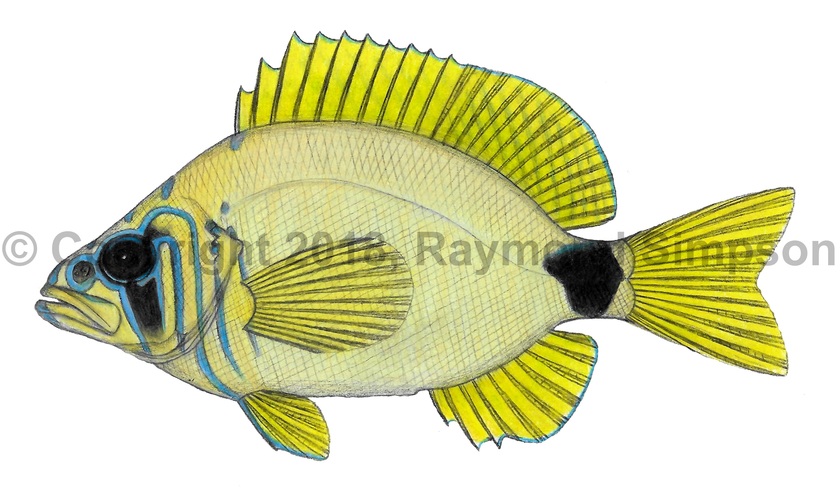
Common Name
Veracruz Hamlet
Year Described
Del Moral Flores, Tello-Musi, & Martínez-Pérez, 2012
Identification
Dorsal Fin: X, 15
Anal Fin: III, 7
Pectoral Fin: 14
Pelvic Fin: I, 5
Lateral Line: 55
Gill Rakers: 17-18 (total in first arch)
Body robust and laterally compressed. Steeply sloping head profile. Dorsal fin continuous with no obvious notch between spiny and soft portions. Anal fin much smaller than dorsal fin. Caudal fin is typically truncate to slightly emarginate. The mouth is large and terminal, with the lower jaw often slightly projecting. Jaws bear villiform teeth, with an inner band of enlarged canines. Scales are ctenoid and cover the body and much of the head. The lateral line is continuous and curves gently along the upper body.
Color
Body pale yellow overall, becoming brown dorsally. A black triangular bar under the eye is prominent, with blue lines on the head. Another separate dark blotch on the snout. There is a large black blotch on the caudal peduncle. The dorsal fin is yellowish with fine blue lines. The rest of the fins are yellow.
Size
Maximum size to 93mm SL.
Habitat
Type specimens caught on coral reefs around 3m.
Range
Southwestern Gulf of Mexico: reefs around Veracruz, Mexico.
References
Del Moral Flores, L.F., J.L. Tello-Musi, and J.A. Martínez-Pérez. 2012. Descripción de una nueva especie del género Hypoplectrus (Actinopterigy [sic]: Serranidae) del Sistema Arrecifal Veracruzano, suroeste de Golfo de México. Revista de Zoología, Universidad Nacional Autónoma de México v. 22: 1-10.
Other Notes
More study with complete taxon sampling, many specimens from all over the Caribbean, and for multiple genes are required to determine just how many “species” of Hypoplectrus actually occur in the Caribbean Sea. The species are morphologically almost identical, and have weak genetic signatures indicating a recent radiation.